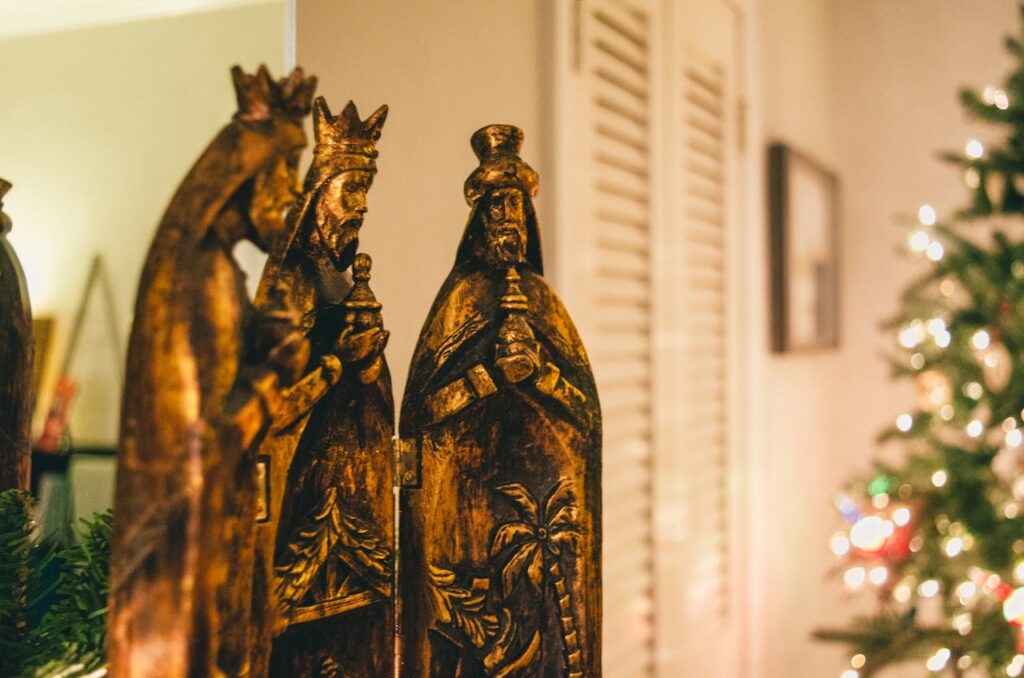
Wise Men
“Then Herod summoned the wise men secretly and ascertained from them what time the star had appeared. And he sent them to Bethlehem, saying, “Go and search diligently for the child, and when you have found him, bring me word, that I too may come and worship him.” After listening to the king, they went on their way. And behold, the star that they had seen when it rose went before them until it came to rest over the place where the child was. When they saw the star, they rejoiced exceedingly with great joy. And going into the house, they saw the child with Mary his mother, and they fell down and worshiped him. Then, opening their treasures, they offered him gifts, gold and frankincense and myrrh. And being warned in a dream not to return to Herod, they departed to their own country by another way.”
Matthew 2:7-12
Christmas carols are great, just don’t get your theology or biblical accuracy from some of them. One song that I have sung many, many times is, “We Three Kings of Orient Are,” which was written by John Henry Hopkins Jr. in 1857. An interesting little fact is that he was the rector of Christ Episcopal Church in Williamsport, PA. Great song! But he takes a few liberties not found in the biblical story. First, the text tells us that they were Magi and not kings. The Magi was “a Persian…then also Babylonian wise man and priest, who was an expert at astrology, interpretation of dreams, and various other secret arts,” according the one Bible Dictionary.[1] The Theological Dictionary of the New Testament notes, “This word has four consistent senses: a) ‘member of the Persian priestly caste,’ b) ‘possessor and user of supernatural knowledge and power,’ c) ‘magician,’ and d) (figuratively) ‘deceiver.’” In essence, they were astrologers and magicians.
Secondly, the Bible does not tell us how many Magi there were. Tradition tells us there were three and even give us their names, “Melchior, Caspar and Balthazar.” I don’t know where the tradition of the names comes from, but the number of them is at least plausible because they bore three gifts. Again, this is speculation because the Bible never tells us how many there were. There could have been two or perhaps an entire delegation. Again, it is possible that there were three each bearing one gift, but we should hold this idea loosely.
There are a several things that these Magi got right. First, they believed that the child who was to be born was “king of the Jews.” Notice the don’t say, “One day he will be king of the Jews.” They understood that Jesus was, from his very birth, already the true King. Second, when they came to enquire from Herod, they said they saw “his star when it rose and have come to worship him.” We don’t know what their beliefs had been up to this point, but they were motivated to find this child so they might give him praise. Third, when the chief priests and scribes looked in Scripture as to where the Christ would be born, these Magi took God at his word and believed Scripture. Fourthly, they traveled a distance over time to find this Child who was King who by this time was living in a house. When they found the Child, they worshiped him! Finally, they were warned in a dream to not to return to Herod, so they departed back to their own country by another way. (v. 12) The hymn writer captures the truth of the gospel in the final four stanzas of this Christmas carol.
Born a King on Bethlehem plain,
Gold I bring to crown Him again,
King for ever,
Ceasing never
Over us all to reign.
Refrain
Frankincense to offer have I,
Incense owns a Deity nigh:
Prayer and praising
All men raising,
Worship Him God on High.
Refrain
Myrrh is mine; its bitter perfume
Breathes a life of gathering gloom;—
Sorrowing, sighing,
Bleeding, dying,
Sealed in the stone-cold tomb.
Refrain
Glorious now behold Him arise,
King, and God, and Sacrifice;
Heav’n sings Hallelujah:
Hallelujah the earth replies.
[1] BAGD on μάγος
